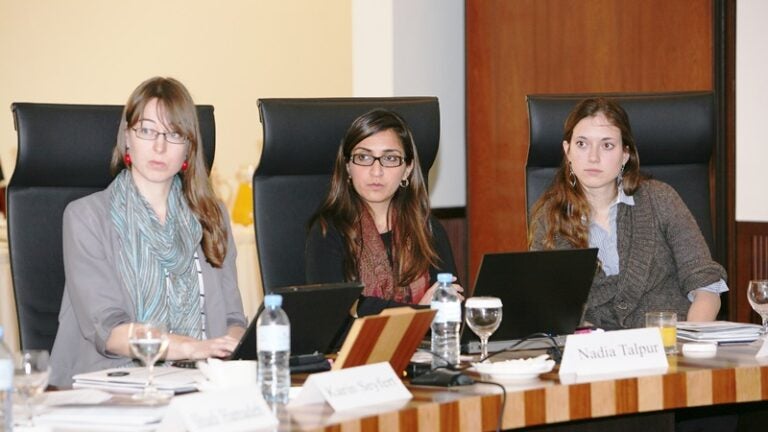Environmental Studies, Focused Discussions, Regional Studies
Food Security and Food Sovereignty in the Middle East Working Group I

On November 13–14, 2011, CIRS held a two-day working group meeting, to discuss issues related to its research initiative on “Food Security and Food Sovereignty in the Middle East.” The working group consisted of experts in the field who deliberated the historical, economic, and political aspects of the discourse as well as specific case studies of some Middle East countries. Also taking part in the meeting were some of the CIRS Research Grant recipients who updated the other working group members on their ongoing research projects and shared some of their preliminary findings.
Due to the unfavorable natural conditions in many Middle Eastern and Gulf countries, these states have never been fully self-sufficient in terms of food and have always had a strong dependence on imported food stuffs. This relationship of dependence on others for a basic human right, make issues of food and food security highly politicized areas. Historically, food and access to food have played pivotal roles in the social contract between governments and their populations and have had major effects on the domestic politics of Arab countries. Especially since the food price hikes of 2008, governments have mandated special strategies and policies to address issues of inflation and simultaneous public unrest. The participants explained how the rise in food prices in the Middle East were a direct trigger for the Arab uprisings and the toppling of entrenched governments. Availability of food is thus a way for governments to gain political legitimacy and not just an issue of healthcare or social welfare.
In the Gulf region, the ruling bargain based on rentier arrangements means that GCC governments must ensure the current and future stability of food supplies and so have invested in several long-term food security plans, both locally and internationally. The participants explained that there was no comprehensive GCC-wide strategy regarding food security, even though there are similarities in their approaches. Currently, rather than addressing the root causes of food price hikes, there is a tendency to treat the symptoms of the problem in the GCC by issuing policies that suppress food prices in order to stabilize the market.
One of the most controversial and highly publicized areas of food security initiatives is the strategy of foreign “land acquisitions.” Although many of these schemes are highly successful in terms of yield, these initiatives are problematic for a variety of political and ethical reasons. Land acquisitions in poor third world countries are not always subject to consensual international laws. It is often the case that laws ensuring land and property rights are weak and not properly enforced, thus paving the way for corrupt practices and forced takeovers of local farms.
On the global level, climate change and environmental issues should be studied as an important part of the research. From a sociological perspective, changes in life-style and habits have increased demand for increasingly diverse types of food, and this in turn has added to increased environmental and economic strains. To the extent that Middle East and GCC countries will continue to be dependent on imports of particular foods, there is considerable scope for regional cooperation. The participants advised these countries to invest in regional or international food storages, whether actual or virtual. The Gulf states need to develop stronger relationships with foreign partners like the World Trade Organization to increase capacity-building measures, rather than rely on the idea of self-sufficiency, which, the participants argued, is ultimately unsustainable.
The participants cautioned that governments’ sudden interest in food security as an area of investment should be viewed critically. Historically, countries have always been subject to fears over future food reserves, making the idea of “food self-sufficiency” a fallacy. Storing food during times of war is part of the world’s collective memory and governments should not give in to the fear mongering inherent in the discourse of food security. Oftentimes, the fear over the availability of current or projected food supplies is used as a pretext to achieve alternative political agendas. Calls for greater domestic food production in the Middle East and the GCC are not rational programs given the limited budgets and/or resources.
- Click here for the working group’s agenda
- Click here for the participants’ biographies
- Read more about the research initiative
CIRS Grant Recipients:
Elisa Cavatorta, University of London
Shadi Hamadeh, American University of Beirut
Jane Harrigan, SOAS, University of London
Karin Seyfert, American University of Beirut
Ben Shepherd, University of Sydney
Salwa Tohmé Tawk, American University of Beirut
Mary Ann Tétreault, Trinity University
Deborah L. Wheeler, United States Naval Academy
Article by Suzi Mirgani, CIRS Publications Coordinator